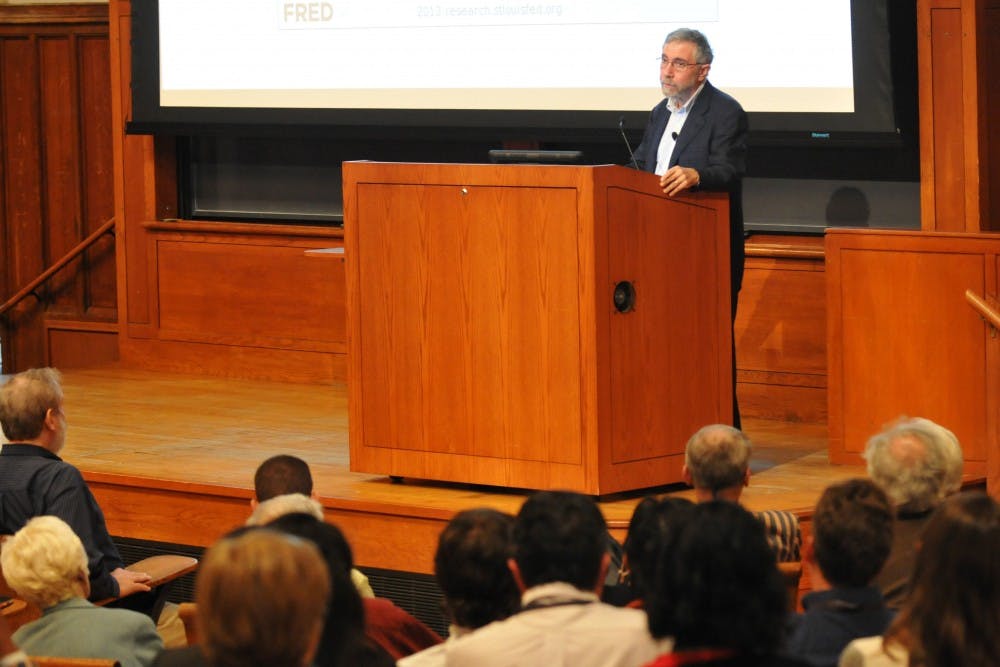Economics professor Paul Krugman explained the danger of attempting to reduce budget deficits in a time of recession in a lecture for the "Many Minds, Many Stripes" alumni conference on Friday afternoon.
Speaking to a packed auditorium of graduate alumni, Krugman discussed “intro economics” in the context of the Great Recession.
The winner of the Nobel Memorial Prize in Economic Sciences for his contributions to New Trade Theory, Krugman is known nationally for his twice-weekly columns in The New York Times. Krugman has taught a wide range of classes at the University, from ECO 102: Description and Analysis of Price Systems, to Economics of the Welfare State, a 500-level class in the Wilson School, but is not teaching this semester. Krugman is also the author of a variety of books, including the 2012 New York Times Bestseller "End This Depression Now!"
Though Krugman is an expert on many aspects of contemporary economics, his topic of choice for Friday’s lecture was accessible to those with only a cursory understanding of the field.
“I just want to go back to basics and talk about where we are right now in the U.S. economy,” Krugman said. “What happened to us?”
For Krugman, the answer is clear. A collapse of private spending led the Federal Reserve to lower interest rates in an attempt to stimulate the economy until those interest rates hit zero.
“And then the lowering had to stop,” Krugman said, to audience laughter.
According to Krugman, the economy behaves in a totally different way once interests rates are at zero.
“The zero lower bound — it sounds technical. It sounds abstruse. You want to say, well that’s something for economists to worry about, but the fact that we hit the zero lower bound, that changes everything.”
The fact that interest rates were so low justified the anti-austerity argument Krugman has made consistently in his New York Times columns since the beginning of the Great Recession, he said.
“When interest rates are zero,” said Krugman, “you should be in favor of more, not less government spending.”
He lamented that this anti-austerity argument had been roundly ignored by world leaders and policymakers over the past five years.

“In the course of the last year,” Krugman said, “there’s been a lot of clarification over the debate in economics. People have stopped talking about expansion in austerity, because it clearly doesn't happen; the evidence showing that high levels of debt were very destructive has collapsed. … So my side, the anti-austerity side, has totally won the argument, which has made absolutely no difference to policies.”
Graduate alumni in the audience also expressed surprise at the disconnect between economists and economic policymakers.
“I think it’s not surprising but remarkable how Krugman said almost all economists agreed on one course of action and all the policymakers aren’t doing that at all,” Arch Davis GS ’69 said. “That’s a real problem today.”
After speaking for 20 minutes, Krugman opened the floor to a long question-and-answer session. One alumnus asked whether the cause of the recession could have been the rising interest rates that occurred immediately before the housing bubble burst. Another wondered about the impact of the recession on students coming out of college and entering the job market for the first time, to which Krugman gave a sobering response.
“The question is how long does it take someone who graduates into a bad job market to recover, and the answer, according to a number of sources, is forever,” Krugman said. “You’ll never get back on the track where you should have been.”
Davis asked a question about the regressive nature of the Social Security tax. In response, Krugman explained how the tax was really a matter of political economy, to make the program seem like an insurance company rather than a means of redistributing wealth. Davis said he felt Krugman gave him a well-thought-out answer.
“I thought it was a pretty good answer,” Davis said. “I think the kind of answer that you’d get depends on your political ideology, and of course, to socialists or people who are halfway socialist, it might seem like a big issue that it’s a regressive tax. To me it seems like those policy issues have changed a lot.”
Though some in the audience said they agreed with Krugman, others held more conservative views than the economist, whose New York Times blog is titled “The Conscience of a Liberal.”
“I watch Krugman every Sunday morning on 'This Week with George Stephanopoulos,' ” Steve Jaffe GS ’68 said. “I actually watch that show because I like George Will ’68, who is a conservative columnist. He’s speaking this afternoon, and he’s better than Krugman.”
Despite ideological divides, Krugman’s lecture was generally well received and he made several jokes throughout the lecture about public figures, such as Federal Reserve Chairman Ben Bernanke and Texas Senator Ted Cruz ’92.
“When I taught at Princeton,” Krugman said, “I worked under the then-department chair. He was one of the best academic administrators I have ever worked with, until he got demoted. What was his name? Bernanke. Ben Bernanke.”








